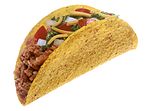Spanish 2/Chapter 13 (Cooking)
Chapter 13 (Cooking)
[edit | edit source]Kitchen items
[edit | edit source]- aceite - cooking oil
- azafrán - saffron
- ajo - garlic
- caldo - broth
- camarón - shrimp
- cebolla - onion
- especia - spice
- estufa - stove
- fregadero - sink
- fuego - fire, heat
- harina - flour
- horno - oven
- mariscos - shellfish
- masa - dough (for breads or cakes)
- microondas - microwave
- olla - pot
- pedazo (de) - piece, slice of
- queso - cheese
- refrigerador - freezer
- salsa - sauce, salsa, gravy (of meat)
- salsa de soya - soy sauce
- sartén - frying pan
- vinagre - vinegar
Recipe instructions
[edit | edit source]- añadir - to add
- no añadas - don't add
- batir - to beat
- calentar - to heat
- cucharada - tablespoon
- freír - to fry
- hervir - to boil
- ingrediente - ingredient
- mezclar - to mix
- pelar - to peel
- picar - to chop
- probar - to taste, to try
- receta - recipe
Note: Calentar has a stem-change of e to ie. Freír has stem-change of e to i. Hervir has stem-changes of e to ie and e to i.
Preparing food
[edit | edit source]- al horno - baked
- apagar - to turn off
- caliente - hot
- ¿Cómo se hace...? - How do you make...?
- ¿Con qué se sirve? - What do you serve it with?
- congelado(a) - frozen
- dejar - to leave, to let
- no dejes - don't leave, don't let
- encender - to turn on, to light
- enlatado(a) - canned
- fresco(a) - fresh
- frito(a) - fried
- olvidarse de - to forget about/to
- no te olvides - don't forget about/to
- tirar - to spill, to throw away
- no tires - don't spill, don't throw away
Other expressions
[edit | edit source]- se puede - you can
Negative tú commands
[edit | edit source]To tell someone what not to do, use a negative command by dropping the -o of the present-tense yo form and add -es for -ar verbs and adding -as for -er and -ir verbs.
- No hables. - Don't speak.
- No comas. - Don't eat.
- No escribas. - Don't write.
Irregular negative tú commands
[edit | edit source]Some verbs have irregular negative tú commands.
- no des - Don't give.
- no estés - Don't be.
- no vayas - Don't go.
- no seas - Don't be.
Etc.
[edit | edit source]- paella - saffron rice dish with seafood, meat, and/or other ingredients (originated in Spain)
- tortilla - flat roundbread made with flour or corn flour (originated in Mexico and Central America)
- taco - folded tortilla stuffed with meat, cheese, beans, and/or other ingredients (originated in Mexico)
Cultural insight (Tortillas y tacos)
[edit | edit source]
Tortillas have long been a staple food in Mexico and Central America. These flatbreads are made from either corn flour or wheat flour. In Mexico, tortillas can be made into tacos, which are tortillas folded and stuffed with chicken or beef, vegetables, cheese, and chile. Tortillas originated from the Aztecs who once ruled a vast empire covering the southern half of Mexico and a part of northern Guatemala until the Spanish invasion of Mexico in 1519. Corn is a plant that originated in the Americas and its name in Nahuatl (the Aztec language) is toconayao.
Today tortillas are very popular in the United States and are becoming more common in supermarkets as fresh or packaged. Tacos are also very popular worldwide and are seen as the international dish representing Mexico.
